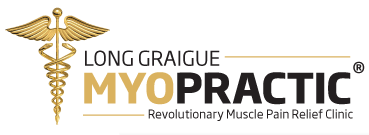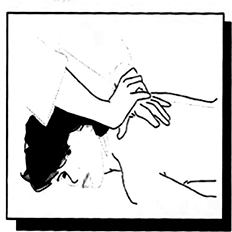Myopractic Institute
Myopractic® Therapeutic Order
Myopractic recognizes seven levels of body work to serve clients with different needs. Myopractic techniques and sessions focus on the four deepest levels:
- Energetic – faintest touch to move energy and promote healing.
- Swedish – soft touch for relaxation, pleasure and improving circulation.
- Sports – vigorous techniques to stimulate and tone the muscles.
- Deep Tissue – Myopractic techniques which go as deeply as is comfortable for the client, up to 50 pounds of weight into the muscles; clears restrictions and reduces chronic pain.
- Posture balancing – advanced Myopractic therapy that goes into the client’s pain threshold with up to 90 pounds of weight; systematically releases holding patterns in the muscles and balances the posture.
- Vibrational Release – Myopractic master-level techniques which achieve profound release by accelerating, rather than sedating, energy in the system using specially-designed power tools.
- Energetic Reintegration – Myopractic master-levels techniques for moving energy at the deepest levels of the mind/body connection by stimulating shifts in consciousness.
Myopractic® Deep Muscle Therapy
Using Myopractic techniques you will realize all the benefits of deep muscle therapy while keeping your hands and body relaxed. Myopractic techniques penetrate deeply, yet gently, into the soft tissue by using the therapist’s body weight rather than muscle strength. Myopractic techniques are safe and comfortable to use because the techniques are applied with the therapist’s hands relaxed, thus protecting your wrists, arms and shoulders.
Myopractic is significantly different from Swedish massage, trigger point and other myofascial therapies. Differences include the therapist’s posture and use of hands, table height, use of oil, therapist/client interaction during treatment, and direction and speed of the work.
Myopractic is made up of three basic techniques:
- Releasing techniques for achieving deep relaxation by relieving tension, spasms and holding patterns in the muscle;
- Clearing methods to clean obstructions from soft tissue, e.g. trigger points, scar tissue, muscle bundles, old bruises; and
- Separating to release myofascial adhesions and balance muscles.
When combined with motion – passive, active and rocking – and used at varying depths, these basic techniques are flexible enough to achieve deep relaxation, spot therapy, and even full posture rebalancing. Myopractic also teaches therapeutic order – which level and technique, in what order, for how long, and when and to whom to refer out – allowing you to achieve maximum benefit with minimum effort.
Myopractic® Posture Balancing
Trauma, disease, stress, developmental problems, and environment can all cause the muscular and skeletal imbalances that lead to chronic pain. In fact, studies show that 85% of the population have developed some type of structural misalignment, resulting in pain along the legs and arms, hips, spine, neck, and even TMJ. Myopractic evaluation identifies the compensations and movement patterns of both functional and anatomical misalignments and verifies these observations with palpation, measuring, and pain-mapping techniques.
Stop chasing symptoms! Myopractic combines deep muscle therapy with posture balancing techniques to align and stabilize the body’s structure. This balancing works with the body’s intelligence, allowing painful compensations to release naturally.
Myopractic® Training
The Myopractic Institute offers advanced training only. We offer the most effective muscle therapy and posture balancing techniques in easy-to-learn formats and at reasonable cost. Choose the types of training that work best for you:
Workshops The best way to learn the basic Myopractic techniques is “hands on.” Workshops combine lecture and demonstration with detailed anatomy review and lots of time for giving and receiving each technique.
The teaching is supported by individual feedback and an illustrated manual.
Illustrated Manual For those who attend the Myopractic workshops, written materials are available which describe each technique and provide detailed anatomical drawings.
Video Lessons A complete video library is a convenient way to review and practice Myopractic techniques.
Myopractic® Instructor – Master Myopractor
James Buckley M.P. L.M.T. The primary instructor of Myopractic is James Buckley, who is in clinical practice since 1992. He has formal training and experience in biomechanics, acupuncture, neuro-muscular therapy, physical therapy, and a wide variety of muscle therapies. It has taken over 20 years to develop his effective, clinical Myopractic System, which now has a 98% success rate in treating patients.
1. Foundational Training
Lower Body
Feet and Lower legs: More than 35 techniques focus on freeing and balancing the muscles of our foundation. Hip and Thigh: These muscles either support the hip from below or pull it out of alignment, creating posture problems, including back pain. 50+ techniques.
Upper Body
Chest and Back: This lesson frees the hips from the chest by releasing the low back and iliopsoas muscles. 30+ techniques, including organ massage.
Arms, Shoulders and Neck: Over 55 techniques to clear the hands and forearms thoroughly, balance the head, neck and shoulders on the torso, and relax the neck. Finish with revitalizing face and scalp techniques.
Introduction to Posture Balancing
You will learn to see, feel and measure the body for imbalances, map pain patterns, and recognize both the differences between functional and anatomical short leg, and how to balance the posture.
2. Master Training
To move energy at the deepest levels, the master Myopractor must create a space for healing to occur. Ideally the therapist’s own system must be clear of all restrictions in order to facilitate deep release in their clients. This advanced training will require Myopractic Foundational Training described above as a prerequisite. Students must also receive the advanced work.
Posture Balancing
This Advanced level of Myopractic bodywork is administered to the client in a 3 to 4 or 7 to 10-session series. These structural integration techniques penetrate very deeply into the soft tissue. The sessions are designed to systematically clear and release tension from the muscles and reorganize and balance the posture.
Vibrational Release and Energetic Reintegration
When going deeper into the muscle will achieve no additional benefit, the therapist can use these techniques to achieve the most profound release of mind and body. Benefits include releasing harmful thinking patterns and emotional blocks, effortless mental focusing, and beautiful changes in voice quality. Private Sessions are available on a limited basis. Clients must be in good health to receive this work.
Myopractic® – Symbol of Professionalism
Myopractic stands for a high-quality and thorough therapeutic approach.
Use of the federal trademark “Myopractic” is available, for a small annual fee, to those who complete Myopractic foundational training.
A Master of Myopractic License will be available to therapists who complete the Master Training.




